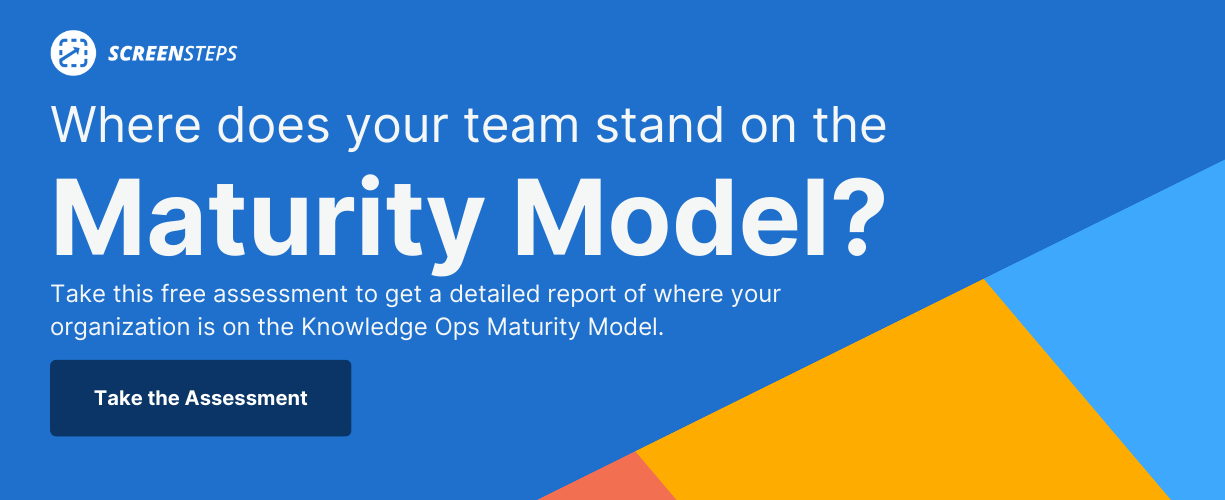7 Benefits of Moving Up the Knowledge Ops Maturity Model
Knowledge is the core of any business operation.
When an organization starts using knowledge more efficiently, the impact is staggering. How you use knowledge in your business impacts almost every important metric a contact center or back-office operations could hope to improve.
The Knowledge Ops Maturity Model is a scale I created for ScreenSteps, a knowledge base software and training solution company. It helps you evaluate where the current state of your knowledge operations is as well as envision where you’d like to be.
Moving up the Knowledge Ops Maturity Model takes work. So, the question is, “Is the effort worth it?”
The short answer is yes. The long answer is this blog post.
Below, I’ve listed seven benefits of implementing new practices so you can make progress on the Knowledge Ops Maturity Model. I’ve included real results from our customers who have adopted the Find & Follow Training Framework to improve their knowledge ops.
/Updated-Knowledge-Ops-Maturity-Model.png?width=800&height=428&name=Updated-Knowledge-Ops-Maturity-Model.png)
Download a PDF version of the Knowledge Ops Maturity Model here.
1. Less stress
Most frontline workers deal with extreme stress. When employees no longer need to memorize complex or lengthy procedures and policies, their work environment becomes much less stressful.
This reduction in stress leads to greater productivity and lower attrition rates.
One customer told us that the entire feeling in their contact center changed when they were able to move from the Document Stage to the Train Stage. People were happier, they performed better, and stress levels plummeted.
2. Shorten training times
If employees have to memorize all the information they will need to do their job, then training times need to be extensive. This usually involves employees sitting through weeks of classroom training, which contributes to low motivation and high attrition rates.
And training is expensive.
Lower training times (when achieved by reaching the Train Stage of the Knowledge Ops Maturity Model) decrease costs, increase employee engagement, and reduce new-hire attrition rates.
We have consistently seen training times decrease by between 50% and 85% when organizations move from Tribal or Document to Train Stage.
3. Increase the span of control
When organizations reach the Guide Stage or higher, they can increase their “Span of Control.” The “Span of Control” is the number of employees a supervisor can oversee and support. This reduces supervisor stress and reduces structural costs.
Supervisors love it when employees can answer their own questions and solve their own problems.
One client of ours was able to move from having one supervisor for every 10 agents to one for every 30. How? It’s simply because they didn't need to spend all of their time answering individual agent questions.
4. Simplify change management
One of the biggest challenges contact centers deal with is change management. Very few have an effective strategy for making sure that frontline agents are aware of important changes in procedures, policies, or other information.
The same problem plays out in back-office operations. Software gets updated or procedures change and everyone has to be retrained.
When knowledge ops are working effectively, change management becomes simple. Instead of retraining everyone, digital guides are updated and employees instantly adapt to new policies, procedures, and software updates.
One of our clients was able to decrease the time it took to update agents on new procedures from 2 weeks to just a few minutes. They no longer took agents all off the phones to retrain them. Agents instantly adapted as the digital guides were updated.
5. Increase consistency
Organizations that are stuck in the Tribal and Document Stages can’t achieve any sense of consistency in their operations. We have all had the experience of asking the same question to two separate help agents and getting completely different answers.
This becomes even more concerning in highly regulated environments such as financial or healthcare organizations.
Effective knowledge ops ensure that everyone follows the same procedures, gives the same answers, and applies policies in the same way.
One of our clients in the medical device industry discovered that all of their agents were using different procedures to troubleshoot the medical devices they supported. It was impossible to establish or enforce best practices.
After moving to the Guide Stage, they were able to ensure that everyone applied consistent best practices when troubleshooting problems.
6. Lower task time
When employees are unsure about what to do, everything takes longer. Every time an employee needs to ask a supervisor or co-worker a question they slow at least two people down.
When employees have digital guides to guide them through their most common procedures, task times plummet.
We had one customer who dropped their average handle time for one call type from 20 minutes to 6 minutes. That was a 14-minute saving every single time that type of call came in.
7. Frees up supervisors’ time
When supervisors aren't spending all of their time putting out fires and answering employee questions, they have the bandwidth to focus on improving the business.
This means your supervisors have time to improve operations and work on projects that will improve the experience for your customers and employees.
Make a plan to progress toward a more mature stage
Moving up the Knowledge Ops Maturity Model takes centralizing your knowledge, creating clear digital guides, and building an interactive training program.
At ScreenSteps, we help companies build Find & Follow Organizations to successfully build these elements that move you up in the Model. We’ve helped dozens of companies move from the Tribal and Document Stages to the Answer, Guide, and Train Stages.
Companies that achieve greater maturity better handle changes in their companies and see improved employee performance.
Want to learn how you can progress to a higher stage on the Knowledge Ops Maturity Model?
Talk to a ScreenSteps rep to learn how you can improve your employee training and documentation practices. Our experts will help you understand which stage your company is currently at and figure out a plan to achieve a higher stage.




